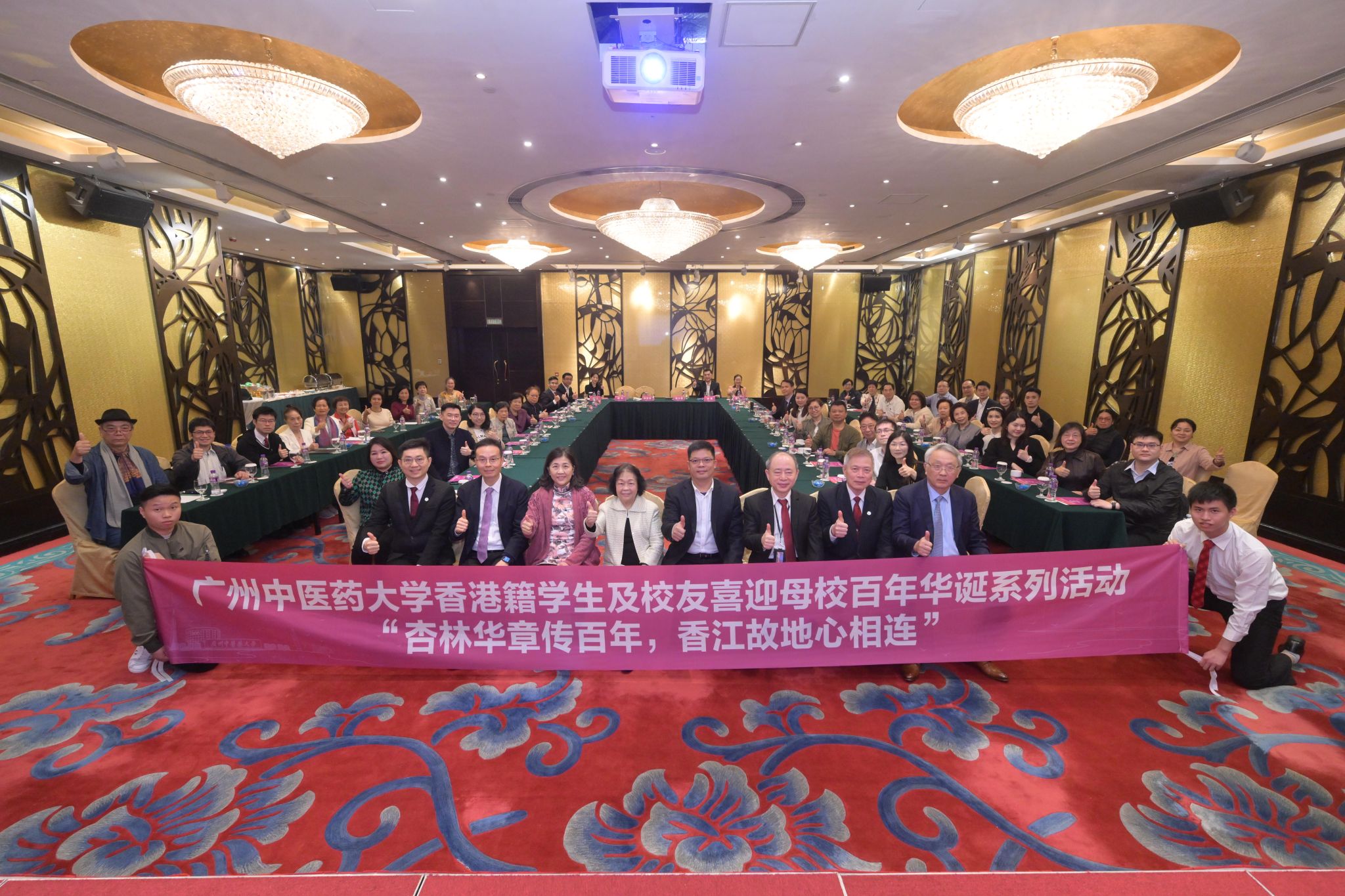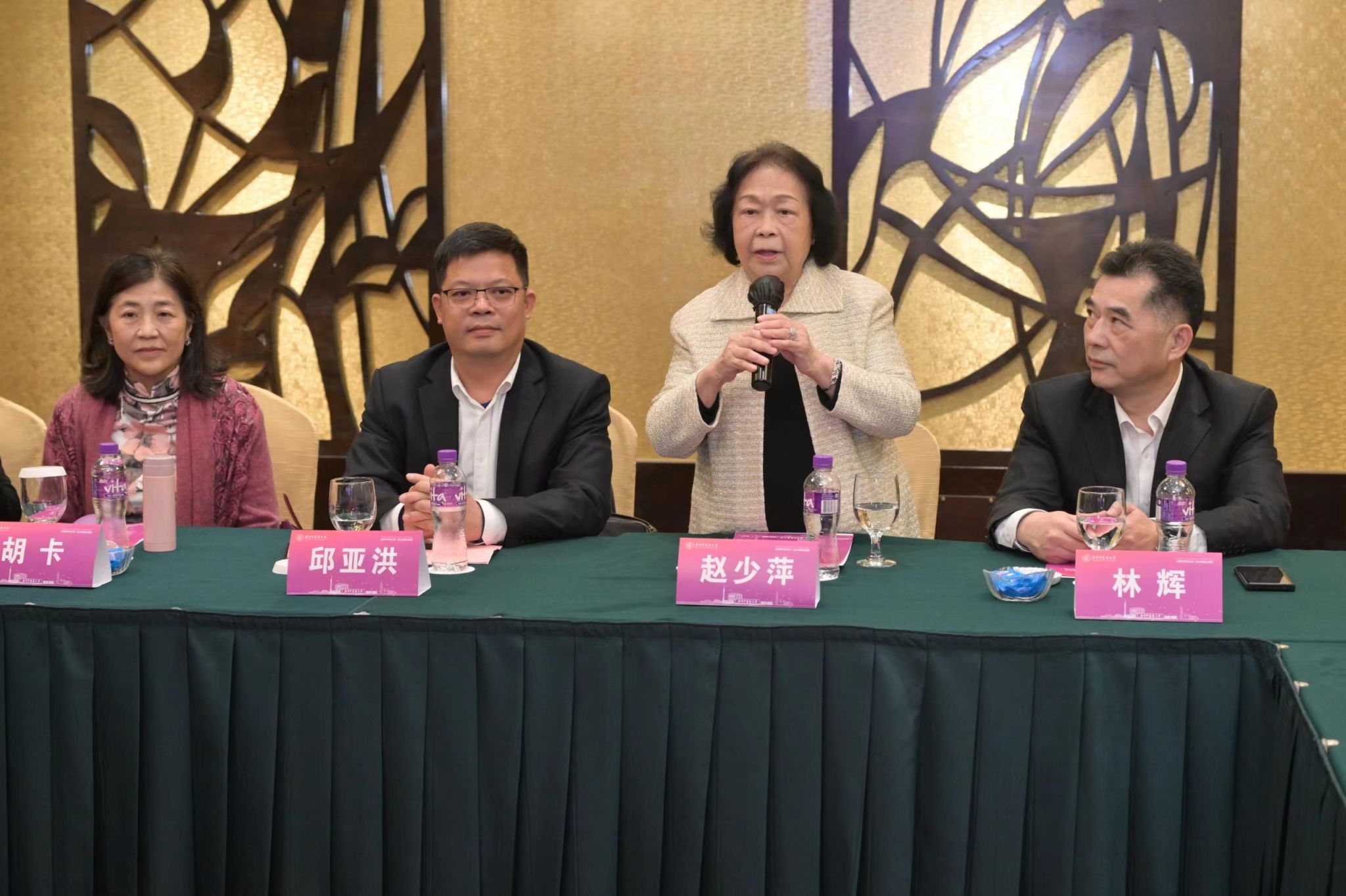2024 marks the centenary of Guangzhou University of Chinese Medicine. On New Year’s Day, January 1, 2024, a group of Hong Kong alumni, along with Qiu Yahong, Deputy Secretary of the CPC GZUCM Committee, gathered in Hong Kong to revisitformer locationwhere the university operated during the resistance against Japanese aggression, reflecting on the century-long heritage of their alma mater.

GZUCMand Hong Kong compatriots united in voice and spirit, connected by bloodlines
Qiu Yahong, Deputy Secretary of the CPC GZUCM Committee, joined the alumni in revisiting the centennial history of the university, emphasizing that with strenuous and persistent efforts, the university was established in 1924 with support from the traditional Chinese medicinal industry in Guangdong and Hong Kong, and in 1933 Guangdong Chinese Medicine Hospital came into being through planning and funding provided by the Guangdong and Hong Kong Chinese Medicine Merchants Association. During the period of the war of resistance against Japanese aggression, the university weathered challenges and temporarily relocated its operations to Hong Kong. GZUCM has been intricately connected with the Hong Kong compatriots from its inception, sharing the same aspirations, spirit, and bloodline. Likewise, the alma mater has maintained a deep connection with its alumni in Hong Kong, acknowledging their contributions to the development of traditional Chinese medicine. The traditional Chinese medicine community in Hong Kong has attained remarkable achievements through the collective endeavors of all involved, with steadfast support from the alma mater. Deputy Secretary Qiu noted General Secretary Xi Jinping’s consistent attention to Hong Kong’s progress and his high expectations on the development of traditional Chinese medicine. It is crucial for the Hong Kong students, who uphold the proud tradition of patriotism and love for Hong Kong, to seize opportunities, forge ahead, and collaboratively shape a promising future for traditional Chinese medicine in Hong Kong.
Reflecting on the journey of the past century, embracing a new endeavor

Zhao Shaoping, Permanent Honorary President of Hong Kong Alumni Association, (Class of 1965), shares insights on the university’s centennial.

Qiu Yahong, Deputy Secretary of the CPC GZUCM Committee, presents a commemorative gift to Zhao Shaoping.
In 1924, “Eight Guangzhou TCM Companies” and “Three Hong Kong TCM Companies” jointly established Guangdong Specialized School of Traditional Chinese Medicine, marking the beginning of modern education in traditional Chinese medicine. In 1933, Guangdong Chinese Medicine Hospital was established with the preparation and funding from the Guangdong and Hong Kong Chinese Medicine Merchants Association. In October 1938, amid the ravages of the Japanese invasion and the fall of Guangzhou, all facilities of the university and hospital were severely damaged. In 1939, the Hong Kong Board of Directors, bearing the financial burden, rented 37 Leighton Road, Happy Valley, as the new campus to resume classes.
In 1956, with the approval of the State Council, Guangzhou College of Traditional Chinese Medicine was established, becoming one of the first four undergraduate institutions of traditional Chinese medicine in the People’s Republic of China. In 1995, approved by the Ministry of Education (formerly the State Education Commission), it was renamed Guangzhou University of Chinese Medicine. The university was initially under the administration of the National Health Commission (formerly the Ministry of Health) and the State Administration of Traditional Chinese Medicine. Its administrative authority shifted to Guangdong Provincial People’s Government in 2000. In 2003, the university became a key university of the “211 Project” co-sponsored by the Guangdong Provincial People’s Government and the State Administration of Traditional Chinese Medicine. In 2017, it was selected as a national “Double First-Class” discipline construction university, followed by its inclusion in the key construction universities in the Guangdong High Level Universities Program in 2018. In 2020, the university became a co-constructed university by the Guangdong Provincial People’s Government, the Ministry of Education, and the State Administration of Traditional Chinese Medicine. In 2021, it was included in the second round of the national “Double First-Class” construction universities and the new round of key construction universities in the Guangdong High Level Universities Program.
A dialogue between the old and the young generation: delving into the century-long history of GZUCM
In a heartfelt video message, 90-year-old senior alumnus Liang Songming extended his warmest wishes to his alma mater on its centenary. Recognized as the “Pharmaceutical King of Guangdong,” Liang played a pivotal role in establishing the Department of Chinese Materia Medica at Guangzhou University of Chinese Medicine. His contributions extended to the founding of the School of Chinese Medicine at The Chinese University of Hong Kong, where he continues to teach to this day, significantly impacting the cultivation of talents in the field of traditional Chinese medicine in Hong Kong.
While reflecting on his youth at GZUCM, Liang Songming shared insights into the evolution of traditional Chinese medicine in Hong Kong. Before the handover of Hong Kong, traditional Chinese medicine lacked recognition and legal status, with Chinese herbal medicine viewed merely as health supplements. Following the handover, there was a notable shift towards prioritizing TCM development, integrating TCM education into the university system, and formally establishing TCM colleges within universities. This marks a profound transformation, underscored by the significant contributions of GZUCM to Hong Kong’s TCM sector. Liang Songming rallied fellow alumni, emphasizing the crucial role the alma mater played in their development in Hong Kong. He urged them to love the country, love Hong Kong, and love the university, encouraging them to utilize their acquired knowledge to serve the public and contribute to the development of traditional Chinese medicine in Hong Kong.


